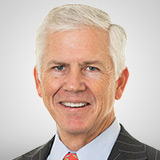Also new to the pages of the Digest, we welcome asset manager Michael Farr. In his latest submission to clients, he offers his view of the necessary events that must occur to create a long-term bull market for equities…
“In our view, three things must take place to ensure a more sustained stock market rally:
“Inflation must be contained. The risk remains that energy prices will resume the upward trend established more than two years ago. Higher energy prices not only tax the consumer and constrain spending, but also can lead to more widespread inflationary pressures throughout the economy. Furthermore, recent employment data suggest the labor market is beginning to tighten again. The unemployment rate for October was 4.4% compared to a peak of 6.3% in mid-2003. Tight labor conditions can lead to wage inflation, which can also result in more widespread inflationary pressures. The hope is that economic growth will moderate enough such that commodity and labor costs level off, resulting in the fabled soft landing we have been hearing so much about. If not, expect more Fed rate hikes.
“The housing market must land “softly” . We are just now beginning to see signs of an unraveling in our nation’s housing boom. Home sales are down sharply compared to last year, and housing prices in the frothiest markets are on the decline as well. To date, we have not yet seen a material effect on consumer spending. However, we could be very early in the process of correction. Perhaps most ominous is the fact that over a trillion dollars in adjustable-rate mortgages are scheduled to reprice in 2007. The consensus view at this time appears to be that the consumer will digest falling housing prices and higher mortgage payments without skipping a beat. But what will happen if next year’s mortgage repricings coincide with a resurgence in energy prices?
“The deficits must be brought under control. For years we have been relying on foreign investment to fund our spending splurges. Nevertheless, the American consumer and the US government seem unwilling to reign in their excessive spending habits. There will undoubtedly come a time when foreign investors become weary of financing our irresponsible spending. When this time comes, the dollar will drop and interest rates will have to rise in order to continue attracting foreign investors. Higher interest rates, in turn, will put the brakes on economic growth.
“As a defensive measure against the aforementioned risks, we expect investors to continue rotating their money from speculative, high-risk investments into stable, blue-chip companies. We call this rotation a “style shift”, and we believe it is long overdue.”


















